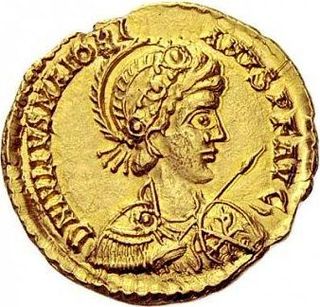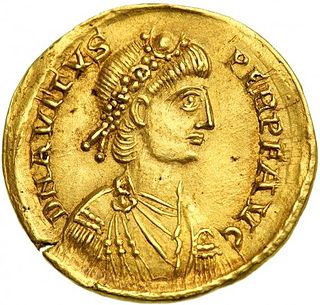
Alaric II was the King of the Visigoths from 484 until 507. He succeeded his father Euric as king of the Visigoths in Toulouse on 28 December 484; he was the great-grandson of the more famous Alaric I, who sacked Rome in 410. He established his capital at Aire-sur-l'Adour in Aquitaine. His dominions included not only the majority of Hispania but also Gallia Aquitania and the greater part of an as-yet undivided Gallia Narbonensis.

Majorian was the Western Roman emperor from 457 to 461. A prominent commander in the Western military, Majorian deposed Avitus in 457 with the aid of his ally Ricimer at the Battle of Placentia. Possessing little more than Italy, Dalmatia, as well as some territory in Hispania and northern Gaul, Majorian campaigned rigorously for three years against the Empire's enemies. In 461, he was murdered at Dertona in a conspiracy, and his successors until the Fall of the Empire in 476 were puppets either of barbarian generals or the Eastern Roman court.

Procopius Anthemius was the Western Roman emperor from 467 to 472. Born in the Eastern Roman Empire, Anthemius quickly worked his way up the ranks. He married into the Theodosian dynasty through Marcia Euphemia, daughter of Eastern emperor Marcian. He soon received a significant number of promotions to various posts, and was presumed to be Marcian's planned successor. However, Marcian's sudden death in 457, together with that of Western emperor Avitus, left the imperial succession in the hands of Aspar, who instead appointed Leo, a low-ranking officer, to the Eastern throne, probably out of fear that Anthemius would be too independent. Eventually, this same Leo designated Anthemius as Western emperor in 467, following a two-year interregnum that started in November 465.

Eparchius Avitus was Roman emperor of the Western Empire from July 455 to October 456. He was a senator of Gallic extraction and a high-ranking officer both in the civil and military administration, as well as Bishop of Piacenza.

Gaius Sollius Modestus Apollinaris Sidonius, better known as Sidonius Apollinaris, was a poet, diplomat, and bishop. Born into the Gallo-Roman aristocracy, he was son-in-law to Emperor Avitus and was appointed Urban prefect of Rome by Emperor Anthemius in 468. In 469 he was appointed Bishop of Clermont and he led the defence of the city from Euric, King of the Visigoths, from 473 to 475. He retained his position as bishop after the city's conquest, until his death in the 480s. He is venerated as a saint in the Catholic church, the Orthodox Church, and the True Orthodox Church, with his feast day on 21 August.
Riothamus was a Romano-British military leader, who was active circa AD 470. He fought against the Goths in alliance with the declining Western Roman Empire. He is called "King of the Britons" by the 6th-century historian Jordanes, but the extent of his realm is unclear. Some Arthurian scholars identify Riothamus as one of the possible sources of the legendary King Arthur.

Gundobad was King of the Burgundians (473–516), succeeding his father Gundioc of Burgundy. Previous to this, he had been a patrician of the moribund Western Roman Empire in 472–473, three years before its collapse, succeeding his uncle Ricimer. He is perhaps best known today as the probable issuer of the Lex Burgundionum legal codes, which synthesized Roman law with ancient Germanic customs. He was the husband of Caretene.

The Battle of Vouillé was fought in the northern marches of Visigothic territory, at Vouillé, near Poitiers (Gaul), around Spring 507 between the Franks, commanded by Clovis, and the Visigoths, commanded by Alaric II. The Franks' victory resulted in their conquest of Gallia Aquitania and the death of Alaric II.

Alcimus EcdiciusAvitus was a Latin poet and bishop of Vienne in Gaul. His fame rests in part on his poetry, but also on the role he played as secretary for the Burgundian kings.
Magnus Felix Ennodius was Bishop of Pavia in 514, and a Latin rhetorician and poet.
The First Council of Orléans was convoked by Clovis I, King of the Franks, in 511. Clovis called for this synod four years after his victory over the Visigoths under Alaric II at the Battle of Vouillé in 507. The council was attended by thirty-two bishops, including four metropolitans, from across Gaul, and together they passed thirty-one decrees. The bishops met at Orléans to reform the church and construct a strong relationship between the crown and the Catholic episcopate, the majority of the canons reflecting compromise between these two institutions.
Ruricius I was a Gallo-Roman aristocrat and bishop of Limoges from c. 485 to 510. He is one of the writers whose letters survive from late Roman Gaul, depicting the influence of the Visigoths on the Roman lifestyle. He should not be confused with his son-in-law, Saint Rusticus.
Tonantius Ferreolus, was a vir clarissimus, or Gallo-Roman senator.
Ecdicius Avitus was an Arverni aristocrat, senator, and magister militum praesentalis from 474 until 475.
Saint Viventiolus was the Archbishop of Lyon 514–523. Later canonized and venerated as a saint within the Catholic Church, Archdiocese of Lyon, France his feast Day is July 12. He is recognised in the Orthodox Church and the True Orthodox Church, including amongst the Tikhonites, as a pre-Great Schism Western Saint.
Tonantius Ferreolus was the praetorian prefect of Gaul from 451.
Saint Rusticus, the successor of Saint Lupicinus of Lyon (491-494), served as Archbishop of Lyon from 494 to April 501. Later canonized and venerated in the Catholic Church, his feast day is 25 April.
Adelfius I or Adelphius I was a bishop of Augustoritum (Limoges) in Haute Vienne from c. 420. Through his son or daughter, born around the same year, he was the grandfather of St Ruricius.
Agricola was an Arvernian noble and son of the Western Roman Emperor Avitus.
Victorius or Victor was an arvernian aristocratic, Count of Auvergne and then dux of aquitania prima from 480 to 489 under the visigothic king Euric.








